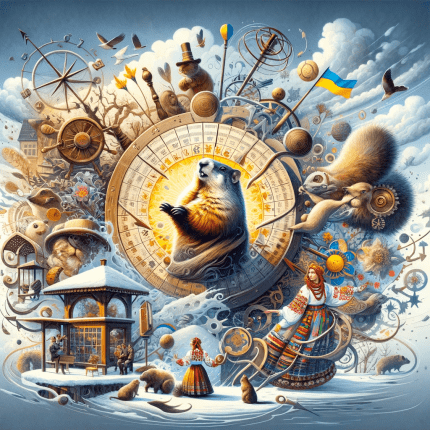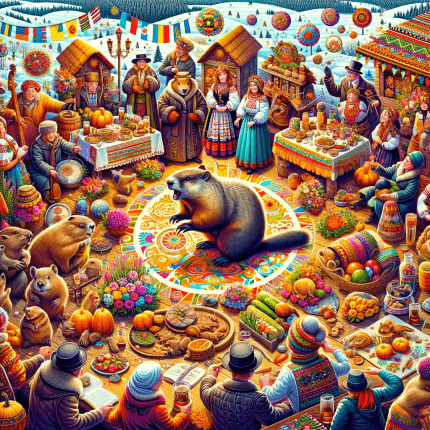Every year on February 2, a special feeling appears in the hearts of Ukrainians, because it is not just an ordinary day - it is Groundhog Day. This unique holiday, which is celebrated in many countries of the world, has found its special place in Ukraine. Although the roots of this day go far to the west, Ukrainian culture absorbed it into new traditions, endowing it with festive rites and symbols.
Groundhog Day in Ukraine is not just a calendar date, but a symbol of hope and a countdown to new beginnings, which personifies the eternal game of nature and man. According to folk beliefs, if a groundhog sees its shadow, winter will last another six weeks, but if it doesn't, spring will soon come. Such a simple folk belief has turned into an exciting tradition that brings people together every year for a joint celebration.
Meaning of Groundhog Day
Groundhog Day is not just an interesting calendar phenomenon, but also a deeply symbolic holiday that occupies a special place in Ukrainian culture. According to tradition, the groundhog's behavior on this day determines when spring will come. This holiday has ancient roots, its history goes back to the times of ancient celebrations of the transitional seasons, but in the modern world it has acquired a new sound.
The idea of February 2 groundhog day in Ukraine is filled with bright images and traditions. People believe that if on this day the groundhog does not see its shadow due to cloudy weather, then spring will come earlier. However, if the day turns out to be sunny and the groundhog sees its shadow, then winter will last another six weeks. It is interesting that in Ukraine this holiday has acquired its own unique features. Here, groundhog day becomes not only about the weather, but also about cultural identity.
The celebration of Groundhog Day in Ukraine includes various folk festivities, where you can meet people in traditional Ukrainian costumes, enjoy local dishes and participate in folklore events. For many Ukrainians, this day is a symbol of unity and togetherness, a time for fun and reconnection with nature and cultural traditions.
Especially in 2024, Groundhog Day 2024 will witness a unique combination of old traditions and modern celebrations. Interest in this holiday grows every year, attracting the attention of not only locals, but also tourists from different parts of the world.
The Babak Day holiday in Ukraine is a great example of how traditional folk beliefs and rituals can be preserved and adapted in the modern world, continuing to delight and unite people regardless of their age or social status.
History and origin of Groundhog Day

Groundhog Day, which is celebrated on February 2, has an ancient and interesting origin. Its roots can be traced back to ancient European traditions, in particular to the Feast of the Assumption, which symbolized the meeting of winter and spring. According to legends, if it was clear and sunny that day, winter will last longer. Over time, this tradition turned into a belief about a groundhog, which, coming out of its hole, "checks" the weather.
With the spread of this tradition to America, it underwent changes and adaptations, becoming the modern "Groundhog Day". This holiday successfully combines ancient beliefs and modern holiday elements to create a unique cultural experience.
In Ukraine, this holiday has acquired a special resonance. The Ukrainian interpretation of "Groundhog Day" combines folk traditions and modern elements of the celebration. It reflects the deep connection of Ukrainians with nature and their faith in the signs it sends. This holiday became a symbol of folk wisdom and respect for natural cycles.
In 2024, Groundhog Day continues to be not only about weather predictions, but also about cultural heritage. This day provides an opportunity to look back at history and understand how ancient beliefs and rituals continue to live in the modern world, adapting to new realities and preserving their uniqueness.
Thus, Groundhog Day is a great example of how historical and cultural traditions can be reinterpreted and preserved in the modern world. It retains its significance and continues to unite people, regardless of their age or origin, around common traditions and festive rites.
Symbolism and traditions: what does Groundhog Day mean in Ukraine
Groundhog Day in Ukraine is not only a day when people try to predict the weather, but also an important part of the national calendar, symbolizing the connection between man and nature. This holiday combines traditions, culture and history, creating a unique cultural phenomenon.
One of the main elements of the celebration is the gathering of people in the squares of villages and cities, where they observe the behavior of the marmot. Various events take place on this day: from folk festivals to thematic concerts. Traditionally, the celebration includes Ukrainian folk music, dances and chants that convey the spirit of the Ukrainian people.
Symbolically, Groundhog Day represents hope for the speedy arrival of spring and the end of winter. The belief that if the groundhog does not see its shadow, spring will come sooner is central to this day. This tradition has become part of national folklore, symbolizing hope and positive change.
In 2024, these traditions continue to live and develop, taking on new forms and contents. On this day, Ukrainians not only monitor the behavior of the marmot, but also celebrate the day as a holiday of national pride and cultural heritage.
Thus, Groundhog Day in Ukraine is not only about weather predictions, but also about the richness and diversity of Ukrainian culture, which is celebrated every year on this special day.
Groundhog Day 2024: how Ukraine celebrates

In 2024, the celebration of Babak Day in Ukraine took on new features, combining traditional elements with modern innovations. This holiday became a vivid example of how Ukraine honors its past while simultaneously looking to the future.
Various festive events take place throughout the country. In large cities, such as Kyiv, Lviv, and Odesa, the streets are decorated with festive garlands and symbols of Groundhog Day. Residents and visitors to the city can enjoy fairs, outdoor concerts, and other cultural events.
A special part of the celebration is the participation of marmots, which are watched with pleasure by both children and adults. These moments become bright and unforgettable impressions that contribute to the unity of the community and the creation of shared positive memories.
This year, a number of educational events were also organized, allowing you to learn more about the history and traditions of Groundhog Day. This not only helps preserve cultural heritage, but also attracts the younger generation to study and appreciate national traditions.
Thus, Babak Day 2024 in Ukraine demonstrates a perfect combination of old and new, symbolizing the revival and continuation of cultural traditions. It reflects the spirit of the Ukrainian people, their ability to appreciate the past and at the same time adapt to the changes of the modern world. This day became not only a time for forecasting the weather, but also a celebration of cultural expression and national unity.
The celebration of Babak Day in 2024 reflects the devotion of Ukrainians to their roots, as well as their readiness to open new horizons. This holiday has become a bright spot in the cultural calendar of Ukraine, demonstrating how traditions can be not only preserved, but also revived in a new context.
Signs and meaning of Groundhog Day

Babak Day in 2024 in Ukraine not only celebrates traditional folk beliefs about the weather, but also emphasizes the deep cultural influence of the holiday. This day is a symbol of the connection between ancient beliefs and modern science, between nature and man.
Predicting the weather by groundhogs is considered a fun and entertaining element of the holiday, but its true meaning lies in the preservation of folk traditions and the connection with nature. This day reminds of the importance of preserving the ecological balance and the need to be attentive to natural phenomena.
In Ukraine, Groundhog Day has become an important part of the cultural calendar, demonstrating a harmonious combination of traditional worldview and modern knowledge. This holiday is a great example of how cultural traditions can be preserved and adapted to a modern context.
Babak Day in 2024 in Ukraine was noted not only as a day of weather predictions, but also as a holiday that unites people, celebrates cultural diversity and promotes the preservation of national identity. He showed how an ordinary folk belief can turn into a meaningful cultural event that reflects the spirit, history and values of a nation.
In conclusion, Babak's Day in 2024 in Ukraine became a clear evidence that tradition and modernity can coexist, enriching each other. This holiday not only predicts the arrival of spring, but also indicates a continuous cultural revival, emphasizing the importance of preserving folk traditions in the modern world.

